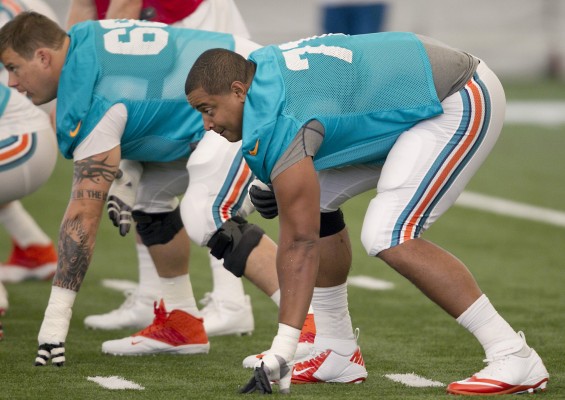Why is Bullying Overlooked in the NFL?
November 20, 2013

In late October, Miami Dolphins player Jonathan Martin suddenly left the NFL team due to emotional stress after being bullied by teammate Richie Incognito. Every week since his departure, there have been more twists and turns added to the story. Currently, Jim Turner, Dolphins’ offensive line coach, is a person of interest in the NFL’s investigation of Martin’s harassment claims, according to Adam Schefter and Chris Mortensen of ESPN. Director of Fordham’s Counseling and Psychological Services, Jeffrey Ng, discusses the “hyper-masculine” locker room culture within the NFL and the problems it creates.
The Observer: Should hazing be banned in the NFL?
Jeffrey Ng: Yes, I think hazing should be banned not just in the NFL, but across all sports, educational and workplace settings. Hazing, by definition, involves the imposition of some form of humiliation, embarrassment or denigration for the purpose of enhancing team cohesiveness, resiliency and performance. All of these objectives, however, can be accomplished, and accomplished more effectively, without hazing.
In fact, as we’ve seen with the Miami Dolphins, hazing can at times fragment a team, which ultimately interferes with their success and performance. Also, there are so many non-shaming and non-denigrating “rites of passages” or “initiation” practices that are much more effective for facilitating team cohesiveness and performance
Observer: Do you think that bullying in the NFL is an overall issue or is this situation isolated?
J.N.: Bullying is an issue not just in the NFL, but societally. That said, I know we’ve all been hearing and reading in the past week that football players should be immune to being bullied because of their physical strength and size. This argument is inaccurate and reductionistic simply because there’s an emotional and psychological component to bullying. Physical strength and stature does not buffer NFL players, or any of us, from emotional or psychological vulnerability or pain
Observer: Some players are actually shy and/or socially awkward, how difficult may it be for them to adapt to the loud, in-your-face locker room culture?
J.N.: I imagine it’d be extremely difficult for them to adjust. In fact, it’s always difficult to adapt to cultural norms, standards and expectations that do not align with who we are or how we experience ourselves. Furthermore, these difficulties can be exacerbated in settings where conformity is enforced by those who are in charge or in power. In other words, if the management or coaching staff of the Miami Dolphins condoned or reinforced a rigid conformity to the “hyper-masculine” culture then I’d suspect that it may be especially difficult for a temperamentally shy or introverted player to fit in.
Observer: What do you think about Martin’s decision to quit the team in the middle of the season and move back home to California? Was it a brave choice or should he have stayed and dealt with the issue head on?
J.N.: I’m not sure that leaving the team and “dealing with the issue head on” are mutually exclusive. I suspect that Martin is dealing with the situation in the best way that he can. Whether or not he should be dealing with it while remaining on the team depends on so many variables, including the team’s culture or norms around conformity and difference.
Observer: Contrary to reports of Incognito being a “dirty” player accused of being a racist and being a bully against other teams, a lot of his own teammates are defending him. In fact some players are angry with Martin. Do you think the locker room would be a safe environment for Martin if he decides to return to the team?
J.N.: The phenomenon of a family or team defending a member who has done something egregious is not unusual. We see this frequently in families where there is abuse, neglect, addiction, etc. This happens in part because of our very comprehensible anxieties about being marginalized, ostracized or rejected by those that we are most closest to and dependent on. Once again, whether or not it’s safe to dissent within a group (and in this case for Martin to return to the team) would depend on the cultural norms and standards that have been created by the group’s leaders.
Observer: So many people are saying that Martin is a grown man and therefore he should not allow another man to bully him. Are sports fans becoming less and less compassionate?
J.N.: I do think that they reflect and reinforce the traditional and hegemonic masculine stereotype that men are suppose to be invulnerable and tough. These stereotypes are likely magnified for professional football players since they are expected to perform in such a “hyper-masculine” way on the field. I’m not sure all of this means that sports fans are becoming less and less compassionate. What I think it does mean is that football fans, due to the nature of the sport and the powerful influence of sports media, may have more entrenched and rigid stereotypes about masculinity.











